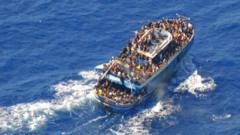A naval court in Greece has formally charged 17 coastguards for their alleged involvement in one of the deadliest migrant boat disasters in recent Mediterranean history, prompting renewed discussions about Greece's response to the ongoing migrant crisis. The tragic event, which occurred on June 14, 2023, involved the sinking of the fishing vessel Adriana near the coast of Pylos, with estimates suggesting up to 650 people may have drowned. Survivors have accused the coastguard of mishandling rescue efforts, alleging that they caused the boat to capsize during a towing attempt while also trying to silence witnesses of the incident.
Greek Coastguards Face Charges Over Deadly Migrant Shipwreck

Greek Coastguards Face Charges Over Deadly Migrant Shipwreck
In a significant development, 17 members of the Hellenic Coast Guard are charged in connection to the 2023 Mediterranean shipwreck that claimed hundreds of lives.
The charges leveled against the coastguards include "causing a shipwreck" by leading to the deaths of at least 82 individuals, a number corresponding to the bodies recovered so far, and "failure to provide assistance" to those in distress. It remains uncertain how many more casualties there may be, as many passengers—mostly migrants from war-ravaged countries—were trapped below deck during the sinking. Criticism has emerged regarding the official Greek narrative, particularly after numerous survivors and advocates contested the coastguard's claims of operational protocols, insisting that their actions exacerbated the situation rather than alleviating it.
The move to charge the coastguards comes nearly two years post-tragedy and follows intense scrutiny of their conduct. Survivors report feeling dismissed and pressured by authorities to remain silent about the incident, igniting discussions on accountability in human rights violations.
Legal teams representing the victims welcomed the charges as a crucial step towards justice, yet doubts linger over the reliability of Greece's legal system. The upcoming legal proceedings will determine if these coastguards will face trial, signaling a potential shift in policy on how such tragic incidents are handled in the context of the European migrant crisis. As Greece continues to confront its role within this crisis, the case highlights broader issues regarding maritime safety and humanitarian responsibility.
The move to charge the coastguards comes nearly two years post-tragedy and follows intense scrutiny of their conduct. Survivors report feeling dismissed and pressured by authorities to remain silent about the incident, igniting discussions on accountability in human rights violations.
Legal teams representing the victims welcomed the charges as a crucial step towards justice, yet doubts linger over the reliability of Greece's legal system. The upcoming legal proceedings will determine if these coastguards will face trial, signaling a potential shift in policy on how such tragic incidents are handled in the context of the European migrant crisis. As Greece continues to confront its role within this crisis, the case highlights broader issues regarding maritime safety and humanitarian responsibility.






















